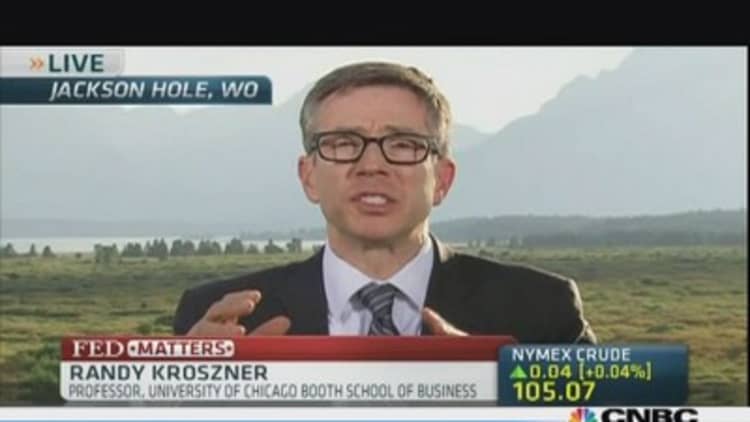Is all the 'taper terror' talk that sparked a week-long sell-off in emerging market assets just lost in translation?
Federal Reserve chief Ben Bernanke has never used the word "taper," noted Randy Kroszner, a former Fed governor and currently a researcher at the National Bureau of Economic Research.
"He doesn't think about it that way. I think he thinks there could be a step down (in its bond-buying program) and then there could be a pause" while deciding whether to go further, Kroszner told CNBC.
(Read more: Emerging markets: dissecting the good from bad)
Kroszner even doubts taper terror was behind the emerging market rout, noting that fundamentals in this asset class have been a concern for a while, especially problems like over-leveraged, bottlenecks in Indonesia and regional policies which are not consistent with sustainable growth.
"Some of the slowdown was occurring already," he said. "This (sell-off) is in some sense adding a little bit of insult to injury for some of these markets, but the fragility was there."

Others are also diverging from the "straight-line down" expectations for the Fed's bond purchases.
"Given some mixed recent economic data, the first move could be just a reduction in monthly asset purchases from $85 billion to $75 billion and it may be positioned as a 'one off' for the time being," Shane Oliver, head of investment strategy at AMP Capital, said in a note.
(Read more: Fed message to markets: Don't fear the taper)
Oliver is also doubtful the taper talk is responsible for the market rout. "Fed taper fears are clearly not helping to the extent they are partly driving a flow of capital back to the U.S., but the broader malaise affecting the emerging world relates to the slower pace of growth in China along with inflation and current account problems," he said. "Underpinning all of this has been a lack of structural reforms."
The taper tantrum may have also spurred an outflow from Treasurys, but "that's consistent with the growth of the economy," said Stanley Fischer, a former Bank of Israel governor and previously the World Bank's chief economist.
(Read more: Emerging market taper terror 'quite overdone': Mobius)
"We really need to get back to more normal conditions, more normal monetary policy," Fischer, currently on the board of the Peterson Institute for International Economics, told CNBC. "That'll make life easier for a lot of countries and a lot of people."
Fischer isn't even concerned about when any tapering might start. "It's not, in the big scheme of things, very important whether the taper starts in September or a month or two later," he said. "By next year, we'll get over (any) delay."

